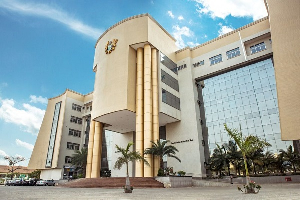The current agitation by Pharmacists to lay down their tools beginning today September 4th is “neither here nor there”, the Fair Wages and Salaries Commission (FWSC) has stated.
The Commission implementing the public sector single spine pay policy said in a reaction statement to the Ghana News Agency on Tuesday and noted that the Government and Hospital Pharmacists Association (GHOSPA) members should rather go to the National Labour Commission to be placed back on the SSSS as the way forward.
It said: “Having sought the suspension or reversal of the migration of members of the GHOSPA on to the SSSS (Single Spine and Salary Structure), all GHOSPA needs to do to is to write back to the NLC to be put back on to the SSSS.” The following are the facts (unedited) as stated in the statement by the Commission on the GHOSPA’s migration onto the Single Spine Salary Structure:
The Facts
The health sector was migrated as a whole following a meeting held at Dodowa from 2nd-5th October, 2011 for the purpose. This included the Medical Officers (Doctors), Pharmacists, Nurses, Allied Health Professionals, Administrators and Allied Groups.
The grades and applicable interim Market Premium factor for the health sector were arrived at in consultation with representatives of Managements of the Ministry of Health, the Ghana Health Service and the Teaching Hospitals with the active involvement of concerned labour Unions and Associations, guided by the job evaluation scores and using administrative factors of internal relativity and consistency.
Following the migration of the health sector onto the Single Spine Salary Structure, however, the leadership of the Government and Hospital Pharmacists Association (GHOSPA) indicated that they had some concerns on their grading and the market premium factor. They therefore requested the suspension of their migration until all their grievances had been resolved. GHOSPA’s grievances revolved around three (3) issues:
- their grading
- the applicable interim market premium factor
- the creation of new/specialist grades for Pharmacists.
The FWSC advised GHOSPA that they could remain migrated whilst they pursued any concerns they had but GHOSPA would not relent. The rationale was that the outcome of these concerns was not a certainty being only proposals which must be agreed on together. Also some of the issues such as the creation of new specialist and consultant grades had nothing to do with the migration at all.
It is worthy to note that the Ghana Registered Nurses Association had similar concerns about their grading, the applicable market premium factor and the creation of new grades but stated that in order to avoid delay in their migration they agreed to be migrated whilst they pursued their concerns. As we write, the Grievance Review Committee is holding hearings with the GRNA on their grievances.
The National Labour Commission (NLC) by a Directive dated 6th February, 2012, with reference No. NLC/182/011/012/90P ordered the reversal of members of the Government and Hospital Pharmacists Association (GHOSPA) to the HSS and the suspension of their migration on to the single Spine Salary Structure after a petition to that effect by GHOSPA. The NLC also ordered that all issues should be resolved by 31st March, 2012.
Following this, the matter between the parties was referred by the NLC to the GRC, which determined the matter on 18th March, 2012. The decision was that the grading given to the Pharmacists by the FWSC was fair. This decision was communicated to the National Labour Commission by letter referenced NLC/182/011/012/9 and dated 23rd February, 2012. As far as the FWSC is aware, GHOSPA has not appealed the decision of the Grievance Review Committee, the proper thing to do as a first instance. And time to appeal has lapsed.
The GRC however indicated that it had no mandate to deal with the issue of market premium. With a view to resolution of the matter, the FWSC, by letter referenced FWSC /D/SCR 12/Vol 3/78 and dated 30th March, 2012, the FWSC indicated its readiness to invite GHOSPA to discuss the outstanding issue of market premium.
The FWSC’s invitation was borne out of the recognition that that the Award by the NLC in the Ghana Medical Association’ case has had the effect of further distorting the relativities matched against the premium offered by the FWSC to the other clinical groups as they applied to the upper echelons of these other groups necessitating the necessary adjustments. GHOSPA refused to meet the FWSC indicating that they had no faith in the FWSC and indeed the National Labour Commission.
GHOSPA also said that they were resolving their issue with the ministry which they claimed was giving them a sympathetic ear. GHOSPA subsequently embarked on a strike action. Not even an ORDER from the NLC dated 2nd April, 2012 could get GHOSPA to budge. The FWSC believes that since GHOSPA refused to meet the FWSC to consider the possible solutions they should therefore not now be seen to be complaining. A National Labour Commission arbitration award ordered the matter to be referred to the Grievance Review Committee (GRC) which in a determination dated 18th March, 2012, found the “grading of Pharmacist as being fair”.
On the issue of the new specialist and consultant positions that has been created, while the FWSC agrees that the Health Council has the mandate to create new positions based on the exigencies of the internal environment, all are kindly reminded that grading and placement of these new grades are the prerogative of the FWSC which would undertake job evaluation based on the job descriptions of these positions to determine the grading and placement based on the results of the job evaluation.
The GHOSPA had evidently not averted its mind to section 2(a) and (b) (i) & (ii) as well as section 3 of the Fair Wages and Salaries Commission Act, 2007 (Act 737) which makes it clear that Job Evaluation (JE), grading and re-grading are the function of the FWSC on behalf of Government, the employer. Section 11 of Act 737 buttresses this by subjecting directives even of the sector ministry to Section 3 as aforesaid. By the combined effect therefore of sections 11 and 3, the FWSC is not subject to any other body in the performance of its functions for good reasons. With the establishment of the FWSC, therefore the management functions of job evaluation, job grading and re-grading, were transferred to the FWSC via Act 737.
The FWSC believes moreover that the creation of these new positions has nothing to do with the current migration exercise being new creations. When these new positions have been evaluated, and graded they would be placed on the SSSS appropriately.
The FWSC however, wishes to register its disquiet about attempts by GHOSPA to sidestep the FWSC in these grading and placement issues and place it at the Ministry of Health in total disregard of the FWSC Act for parochial reasons. Civil Society organizations should be seen to be helping to strengthen constitutional bodies and statutory institutions rather than weakening them.
What associations and unions should know by now is that with the establishment of the FWSC, the practice where associations got their ministries to have special packages for them is far gone. Now salaries and allowances of all public service employees are under the umbrella of the Single spine Salary Policy and Structure.
Though we understand these agitations as resistance to change, we counsel these associations to come to terms with the new situation early for industrial harmony to prevail. Leadership of these associations have a huge role to play in this.
Conclusion
In Conclusion, the FWSC believes in view of all the above, that the current agitation by the Pharmacists over the purported non-migration of the Pharmacists on to the Singe Spine Salary Structure is neither here nor there. Having sought the suspension or reversal of the migration of members of the GHOSPA on to the SSSS, all GHOSPA needs to do to is to write back to the NLC to be put back on to the SSSS.
The FWSC considers Unions and Associations as its primary stakeholders whom the FWSC is created to serve. As a human institution, one may not always agree with its decision. That is why as part of our industrial jurisprudence, dispute resolution procedures/mechanisms are provided in both the FWSC Act and the Labour Act. The least that citizens and stakeholders alike can do is to adhere to these procedures/mechanisms as a way of strengthening our institutions and therefore the democratic path we have chosen for ourselves as a nation.













